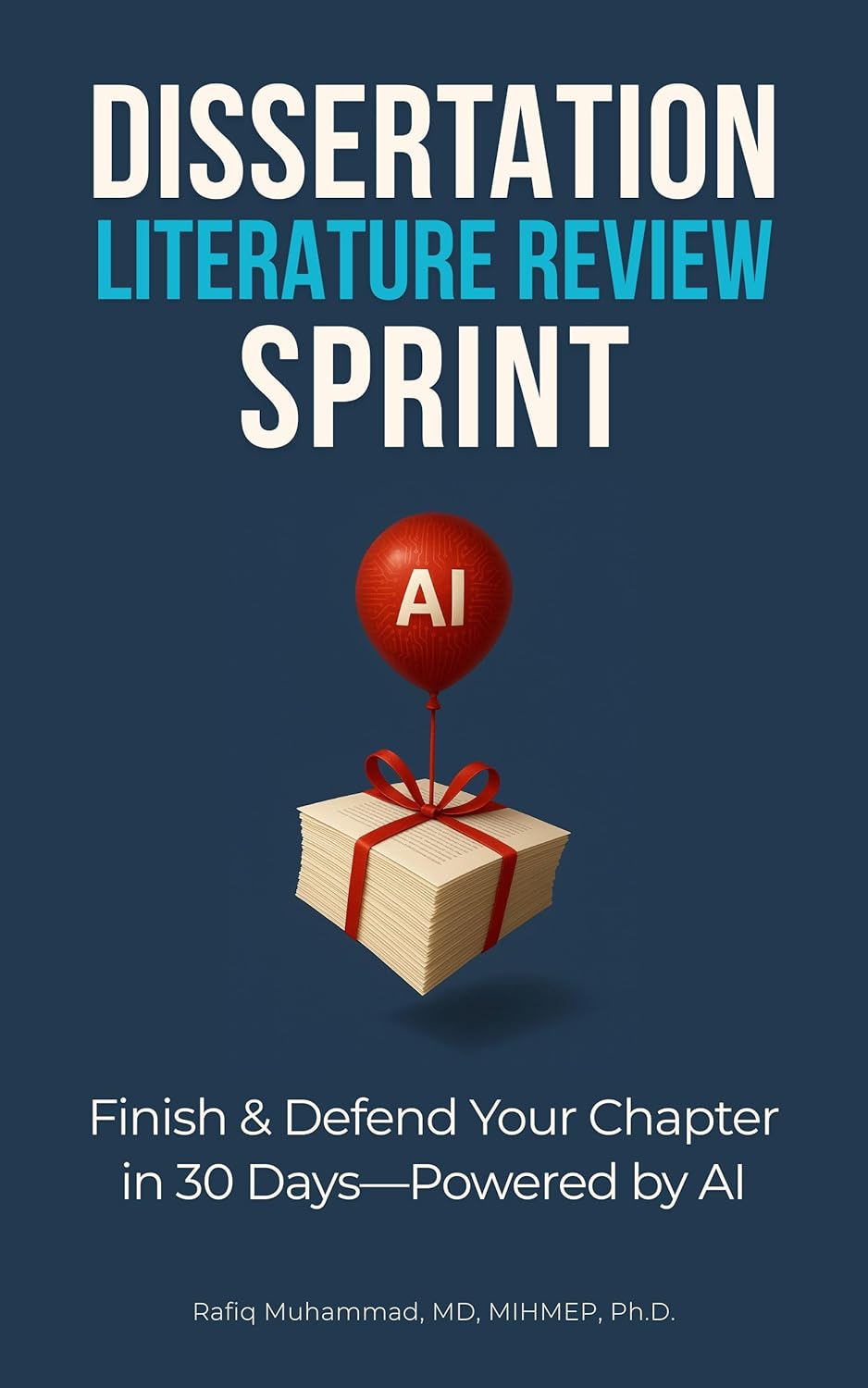Dissertation Literature Review Sprint: Finish & Defend Your Chapter in 30 Days — Powered by AI
Dissertation Literature Review Sprint gives you a structured 30-day literature review sprint that balances reading and synthesis with a practical daily research schedule. You’ll use AI-assisted research prompts, evidence matrices, and concept maps to move from scattered sources to a publishable, defensible chapter—without sacrificing academic integrity.
The plan emphasizes responsible AI usage (disclosure and verification), efficient research reading strategies, summarising articles with note-taking systems, and clear paraphrasing and academic voice. You’ll track sources with citation management and manage cognitive load using sprint-friendly focus blocks. It’s not a PRISMA systematic review; the PRISMA vs sprint guidance shows when narrative/thematic synthesis is appropriate for a dissertation chapter.
- 30-day schedule: discovery → triage → synthesis → drafting → polish & defense prep.
- Daily prompts: AI-powered tasks for search expansion, triage, memoing, and theme testing.
- Evidence matrices & concept maps: convert notes to defensible themes and arguments.
- Literature review templates: search logs, inclusion/exclusion sheets, and outline planners.
- Note-taking systems: structured summaries, quote/claim tracking, and citation anchors.
- Paraphrasing & voice: sentence-level scaffolds to maintain clarity and integrity.
- Time management for graduate students: 60–120-minute blocks, weekly check-ins, and buffers.
- Citation management: organize sources, dedupe, and insert citations as you draft.
- Responsible AI usage: retrieval-first prompts, verification steps, and disclosure language.
- Defense preparation: slide blueprint, common committee questions, and talking-point cues.
Follow the sprint to finish a rigorous dissertation literature review in four weeks, with a clean chapter, a documented search trail, and a defense-ready deck that clearly links your themes, gaps, and research direction.
What’s inside
- Clear chapter-by-chapter roadmap
- Reusable templates and checklists
- Step-by-step examples from real projects
Who it’s for
- Graduate students (MA/MSc/PhD)
- Early-career researchers
- Supervisors seeking practical frameworks
What readers say
“Exactly what I needed to get unstuck.”
“Concise, rigorous, and practical.”
What you'll learn
- Day‑by‑day plan with 100+ AI prompts
- Evidence matrices, concept maps, and synthesis workflows
- Defense‑ready polish: structure, citations, and voice
Frequently asked questions
Can I really finish a dissertation literature review in 30 days?
Yes—if you follow the focused daily plan (about 60–120 minutes a day) and stick to the scope you define in Week 1. The sprint replaces open-ended reading with structured search, triage, synthesis, drafting, and polish.
Will AI write the chapter for me?
No. AI assists; you decide. The book shows responsible use of ChatGPT, Elicit, Scite, Rayyan, and Zotero for discovery, triage, organization, and drafting—paired with verification steps, citation checks, and disclosure language.
Which AI and research tools are used in the 30-day plan?
ChatGPT (structured prompts), Elicit (paper discovery/triage), Scite (citation context), Rayyan (screening), ChatPDF (document Q&A), Zotero (references), plus concept maps and evidence matrices to drive synthesis.
What if I’ve already read a lot but have messy notes?
Days 8–17 focus on turning scattered notes into themes, debates, and a defensible outline using evidence matrices, concept mapping, and summary tables. You’ll consolidate what you have instead of starting over.
Does the sprint help me avoid overreading and rabbit holes?
Yes. You’ll define inclusion/exclusion criteria, set a search log, and use AI-assisted triage to decide what to skip, skim, or study—then move quickly to synthesis and drafting.
Is this a systematic review (PRISMA)?
No—it’s a dissertation chapter sprint (narrative/thematic). You’ll still document a transparent search strategy and screening decisions, and you can include a PRISMA-style flow diagram if your program expects it.
How does the book prevent AI hallucinations and bad citations?
You’ll use retrieval-first prompts, DOI/PDF-grounded extraction, Scite for citation context, and a verification checklist. The sprint prioritizes traceable evidence and accurate references in Zotero.
Does it cover paraphrasing, academic voice, and reference formatting?
Yes. Days 18–25 cover paraphrasing with integrity, voice/flow edits, and reference formatting (e.g., APA/MLA/journal guidelines) using Zotero + writing assistants like Trinka/Typeset.
Will this prepare me for my proposal or defense?
Yes. Days 26–30 link your review to the methods chapter, anticipate common committee questions, and help you defend choices about scope, inclusion, themes, and gaps.
What if English isn’t my first language?
The sprint includes clarity and tone checks, sentence-level revision prompts, and reviewer-style critiques to help you communicate clearly and confidently.
Do I need paid tools?
No. The plan is “free-first.” Where a paid option is mentioned, a free/academic alternative is offered.
Who is this for?
PhD and master’s students writing a literature review chapter, returning researchers restarting a project, and anyone who needs a concrete, time-boxed plan to finish and defend with confidence.
